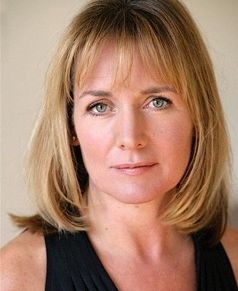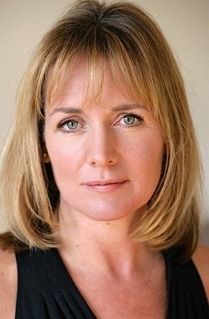 CAROLINE LANGRISHE is best known for her television roles as Charlotte Cavendish in Lovejoy, Georgina Channing in Judge John Deed, Marilyn Fox in Casualty and Judith Leicester in Doctors. She will be appearing in CAROLINE’S KITCHEN at the Everyman in Cheltenham from 26th February. In this exclusive interview she talks to StageTalk Magazine’s Fenton Coulthurst
CAROLINE LANGRISHE is best known for her television roles as Charlotte Cavendish in Lovejoy, Georgina Channing in Judge John Deed, Marilyn Fox in Casualty and Judith Leicester in Doctors. She will be appearing in CAROLINE’S KITCHEN at the Everyman in Cheltenham from 26th February. In this exclusive interview she talks to StageTalk Magazine’s Fenton Coulthurst
Caroline’s Kitchen is now touring having had a popular run in London. What is the play about?
Well first of all, it has slightly changed from its London outing in that the title and the character’s name have changed – very much in my favour as she’s now called Caroline. Which is pure coincidence! But it’s about a celebrity chef – imagine a Nigella-type – who has it all and in the course of one disastrous and chaotic evening her life unravels. So I would say it’s like a backstage peep into the real life of Caroline’s kitchen as opposed to the television show of the same name.
Why do you think Caroline’s Kitchen has resonated with audiences so well?
I suppose we are all, secretly, envious of women who appear to have everything. Wealth, glamour, being brilliant housewives, being brilliant cooks, having the perfect home counties style family. I think one of the attractions is you see it as it really is, which is not glamorous at all and the cause of much hilarity.
Interesting wording about being envious of ‘women who appear to have everything’. Do you think this is a gendered look at lifestyles of privilege?
I don’t know, because you can say the same of Jamie Oliver. You can say he’s the perfect dad with the perfect lifestyle, with tonnes of money, and he’s a brilliant cook. Similarly, I wonder what it would actually be like if you were to take the roof off his house and got a look inside. And of course, there are instances of Nigella and our beloved Delia Smith being caught by the tabloid press in a state of some sort or other.
So I think the play really exposes celebrity fantasy for what it really is. That’s one way of looking at it, the other being that it’s just a snapshot of a privileged happy family in meltdown.
What do you find most interesting about playing Caroline?
I can relate to a fair amount of it. I know what it’s like to be a working mother and someone in the public eye. I know it’s like spinning plates trying to manage family life alongside all that. Certainly when I was doing Lovejoy for all those years, I had two small children and it was tricky. On a domestic level, I know what it’s like trying to produce family meals, trying to keep everyone fed, trying to keep everyone happy, even when your emotional life is in turmoil.
Certainly I can’t draw on my own life for all of it, but there are areas I can identify with. It is a middle class, home counties type family so they are not very representative of what I grew up in but are very representative of what I grew up around.
Where there any TV chefs you found particularly useful to draw upon for this role?
Not so much. To an extent I have Nigella in the back of my mind, but I feel a bit more Joanna Lumley in the role. That sort of perfect, charming, glamorous, upper middle class older woman. I was watching her presenting the BAFTAs the other night and couldn’t help thinking ‘that is just like my character’. It is a very glamorous front that’s considered to represent Middle England perfectly.
What have you enjoyed the most about working on this play?
I’ve enjoyed all of it, to be perfectly honest. The second half does go particularly barmy. There’s a very dramatic thunderstorm and her world unravels. Caroline has a bit of a problem with alcohol so I get to play drunk more and more as the play goes on, which is great fun. In acting terms, you get to misbehave. Plus, the fake champagne we have tastes just like real champagne and makes you quite giddy. I’ve got to buy it in from now on.
Do you think there’s a message behind the play? Something the writer wanted to get across?
Well for the writer, I think it’s very autobiographical. My husband within the play is based upon the writer’s father. He has that upper middle class fury and lack of emotional expression. These are recognisable characters – he’s a banker who plays golf, need I say more? It plays into stereotype but, if you are in one of those families, it is quite painful and that is what the play speaks to. I have son in the play who is trying to come out and this is clearly not the family where that sort of thing is done.
It’s quite anti-PC in a lot of respects. The characters don’t pussyfoot around anything. It’s upper middle class kitchen sink as opposed to Ken Loach kitchen sink.
Do you think a lot of it is to do with sublimated aggression? Presenting a front when there’s really something you want to say whether it is one camera or in the household?
I think we’re all afraid of saying anything nowadays. Absolutely terrified of accusations flying at you. I think it’s all gone completely barmy, myself, and I think it’s not alone in that. So yes, I think the characters are reacting against that, and plays are a wonderful platform where you can write about anything in any style you like. So I would say this is more Ayckbourn territory than your Royal Court drama.
What experience do you think audiences take away from the experience? Is it having a laugh at someone else’s expense?
It’s quite a sad story so I always describe it as a black comedy. It’s true to say that it does descend into farce but it starts off quite dark. Audiences sometimes don’t laugh and sometimes they laugh uproariously. There’s no sure-fire laugh on a funny line because it’s affecting audiences very differently.
Does the response from the audience vary a lot based on where you’re touring Caroline’s Kitchen?
Well, we haven’t been touring for very long but my assumptions have been overturned. We started in Derby where I thought they’d loathe this home-counties-spoiled-people angle but they were our best audience for laughs. It was a real rollicking comedy. Then in Tunbridge Wells, where I thought this was a much more at home, they were much quieter. Perhaps hitting too close to home. Now in Northampton they’ve been loving every second of it, they engaged from the get-go. The different ways it’s playing to audiences up and down the country keeps you and your toes and requires an enormous amount of energy.
It is terribly fun to be touring a comedy though. I would not like to be touring in Hedda Gabler. There’s a buoyant atmosphere to the production and I’m getting to see bits of the country I wouldn’t otherwise have an excuse to visit, which is great fun. And then we have a nice carrot at the end of the tour with New York, which we are all looking forward to.
© Fenton Coulthurst/StageTalk Magazine 2019 All rights reserved.
Caroline’s Kitchen comes to the Cheltenham Everyman on the 26th February.


